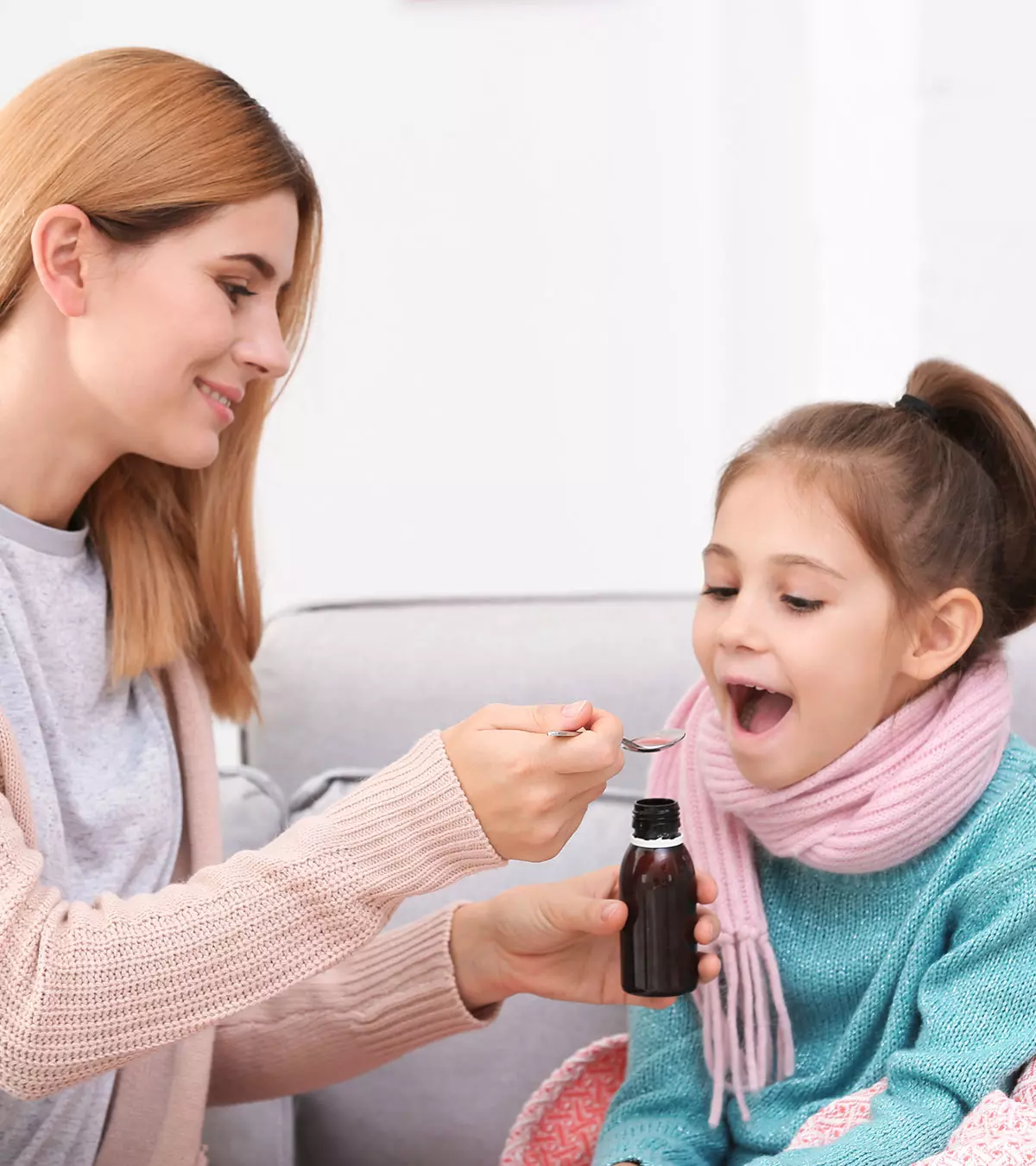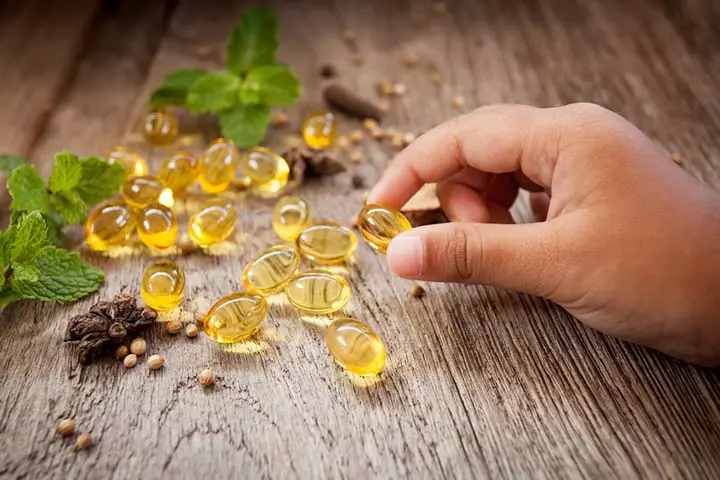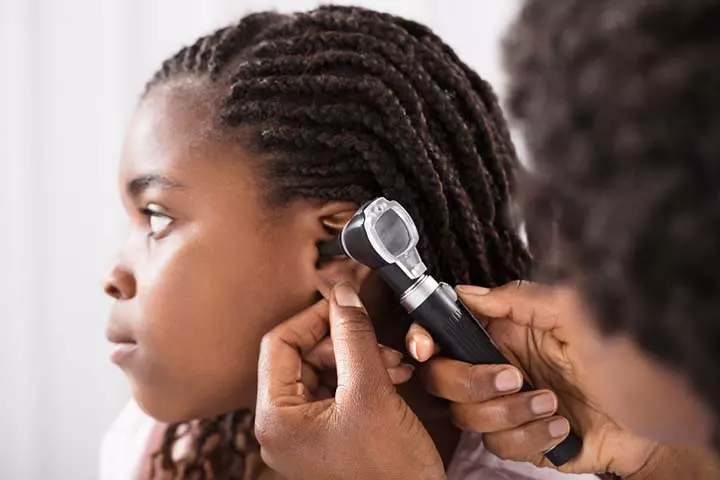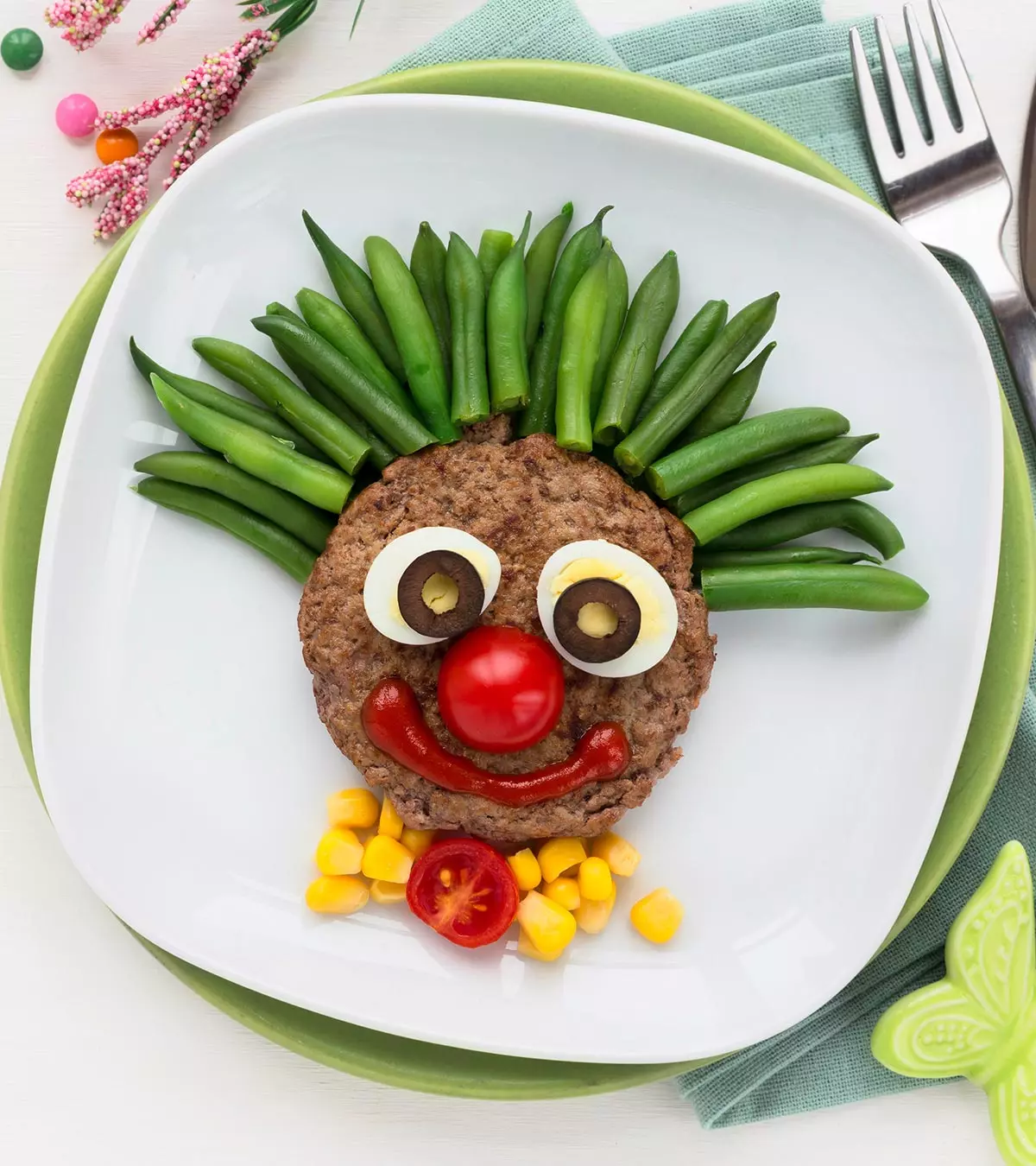
Image: ShutterStock
Cod liver oil for kids is a nutritional or dietary supplement derived from the liver of the codfish. It contains essential nutrients, such as vitamin D and omega-3 fats, which help in the healthy growth and development of children. But since most healthy children can get all the nutrients from a well-balanced diet, feeding them supplements isn’t usually necessary.
Dietary supplementation may become essential if you suspect your child’s dietary intake is insufficient or they have medical issues that interfere with digestion and absorption of nutrients. Consulting a pediatrician is necessary to know the right brand and dosage of cod liver oil suitable for your child. Read on as we tell you about the possible health benefits of cod liver oil for children and the side effects that they may cause.
Key Pointers
- Cod liver oil is rich in vitamins A and D and omega-3 fatty acids. It is available in liquid or capsule forms.
- It is usually safe for children, but a doctor’s prescription is advisable.
- The supplement is beneficial for preventing bone and eyesight-related disorders, ear infections, and more.
- It may cause loose stools and fishy burps as side effects.
- Cod liver oil should not be given to children with seafood allergies.
What is Cod Liver Oil?

Cod liver oil is the oil extracted from cod fish’s liver. Cod is a type of fish that belongs to the genus Gadus and is an organic source of nutrients such as vitamins A and D, omega-3 fatty acids, namely EPA (eicosapentaenoic acid) and DHA (docosahexaenoic acid) (1).
Cod liver oil is categorized based on its method of extraction and processing. The following are the two types of cod liver oil:
- Regular cod liver oil: Oil is extracted, processed, and refined at a high temperature. It is available in the form of supplements after synthetic vitamins are added to it.
- Fermented cod liver oil: It is extracted without heat and is fermented for 6-12 months. It is a natural product and is taken as food.
Cod liver oil is available in oil and capsule forms.
Both these forms contain 10% EPA and 10% DHA (2). This constitution profile makes it healthy and worthy of attention. But can cod liver oil be part of children’s diet?
 Did you know?
Did you know?Is It Safe To Give Cod Liver Oil To Kids?

Cod liver oil is usually safe for children when taken orally and in the right amounts (4). It can also be used externally to heal wounds, burns, and rashes.
There is no recommended cod liver oil dosage for children. So, it is best to take the doctor’s opinion before giving it to them. Doctors usually prescribe cod liver oil for children only if they think that the supplement is required.
Nutritional Value of Cod Liver Oil
The table below lists the different nutrients and their value per 100g of cod liver oil (5).
| Nutrient | Nutritional value |
|---|---|
| Energy | 902 kcal |
| Vitamin A, RAE | 30000µg |
| Retinol | 30000µg |
| Vitamin A, IU | 100000 IU |
| Vitamin D (D2 + D3) | 250µg |
| Vitamin D | 10000 IU |
| Fatty acids, total saturated | 22.608g |
| Fatty acids, total monounsaturated | 46.711g |
| Fatty acids, total polyunsaturated | 22.541g |
| Cholesterol | 570mg |
When taken as directed by the physician, cod liver oil can offer certain benefits to children.
What Are The Potential Benefits Of Cod Liver Oil For Kids?
Cod liver oil offers several benefits to children, some of which are mentioned below.
- Vitamin D helps prevent rickets: Rickets is a condition that affects the bones and bone joints due to the deficiency of vitamin D in children. Its symptoms include bowed legs, projected breastbone, and thick wrists and ankles. A teaspoon of cod liver oil provides the recommended daily intake of 400IU of vitamin D. Giving this to your children may prevent vitamin D deficiency (6).
- Might prevent upper respiratory illness: According to a study, intake of cod liver oil decreases the bouts of upper respiratory diseases that are prevalent during winter and spring (7).
- Reduces ear infections: When taken with a multivitamin supplement, cod liver oil may help reduce ear infections in children. It might also be helpful in managing allergic rhinitis and ocular disease (8) (3).

- Vitamin A is good for eyesight: Data from the Centers for Disease Control and Prevention reveals that around 6.8 percent of children under 18 in the United States have a diagnosed eye and vision condition. Cod liver oil, which contains vitamin A, may offer potential benefits. Vitamin A for children helps in maintaining eyesight and night vision. It also helps strengthen the immune system and fight infections (9).
- Omega 3 might help ADHD symptoms: Omega-3 fatty acids present in cod liver oil may help in reducing the symptoms of ADHD in children aged seven to 12 years by acting on the brain receptors (10).
- Lowers risk of type-1 diabetes: A study published in The American Journal of Clinical Nutrition 2003, proposes that intake of cod liver oil during the first year of life may help lower the risk of type-1 diabetes (11).
- Strengthens immunity and improves heart health: The Omega 3 fatty acids present in cod liver oil may help strengthen your child’s immunity and also improve cardiovascular health (12).
 Did you know?
Did you know?While we learn about the benefits of cod liver oil, we must also know about any side-effects it might have.
What Are The Side Effects Of Cod Liver Oil?

The side effects of cod liver oil are usually mild. Any side-effects that the child may experience usually resolve on their own. Some of the common side-effects include (13):
- Bad breath
- Heartburn
- Burps that smell fishy
- Loose stools
- Nausea
Also, severe reactions may occur if the child is allergic to seafood or the dosage is inappropriate. So, consult a doctor before starting cod liver oil supplements for your child.
Children who are sensitive to cod liver oil could have (14):
- Vomiting
- Diarrhea
- UrticariaiA condition commonly known as hives and causes inflamed, itchy rashes on the skin (a kind of rash that causes itchiness and swelling, and red welts)
- A combination of the symptoms mentioned above
Children having eczemaiA common skin condition characterized by itchy, red, and dry skin and asthma might have their condition aggravated. Besides allergic reactions, the effects of an overdose of vitamins A and D could be seen in children.
- An excess dose of vitamin A (> 1500μg/day) can increase the risk of bone fractures (15)
- An overdose of vitamin D causes build-up of calcium in blood (hypercalcemia), which can cause nausea and vomiting, weakness, and frequent urination. Symptoms might progress to bone pain and kidney problems, such as the formation of calcium stones, or increased levels of calcium in the blood serum can lead to bone loss and fractures (16).
All said and done, cod liver oil has a smell and taste that children may not like. Here are a few tips for feeding cod liver oil to kids.
How To Make Your Child Take Cod Liver Oil?

Cod liver oil has a fishy smell and taste, which makes children reluctant to take it. Drinking a spoonful of cod liver oil as it is can be difficult. However, you can make it easier to consume.
- Try cod liver oil supplements, which are available in the form of chewable tablets.
- Try the flavored brands of fermented cod liver oil, where the flavor masks the fishy smell and taste.
- Add it to their favorite foods or smoothies, or acidic juices made of lemon or grapefruit
- Blend it with honey or sugar syrup.
Explaining how she and her husband plunged on a technique to give cod liver oil to their children, Dawn Marie, a mother of four, recounts, “My genius husband came up with the idea to use pure maple syrup, and we sort of sandwich it in a syringe, and everyone takes it happily. So, I start with pulling up just a little bit of syrup (maple syrup). If I’m going to dose my child one milliliter of cod liver oil, and I went to point five with the syrup in the beginning, then I go to 1.5 when I stick it (cod liver oil) down into here (i).”
Never force the children to take this oil, as they may throw up or choke on it if they find the smell or flavor repulsive. Consult your doctor immediately in the case of any side-effects.
Frequently Asked Questions
1. At what age can a baby take cod liver oil?
Babies can begin taking cod liver oil by seven months. However, you must consult your doctor before introducing it to them (18).
2. What dosage of cod liver oil is suitable for children?
Cod liver oil is rich in omega-3 essential fatty acids, eicosapentaenoic acid (EPA) and docosahexaenoic acid (DHA). According to the European Food Safety Authority, infants and toddlers aged seven to 24 months need 100mg of DHA per day, while children over two years need 250mg of EPA/DHA per day (18).
3. Is cod liver oil better than fish oil?
Both cod liver oil and fish oil for babies provide several health advantages. Yet, cod liver oil is a good source of vitamins A and D, and fish oil is rich in omega-3 fatty acids. The choice depends on the child’s specific nutritional needs and preferences (4) (19).
4. Can cod liver oil interact with any medications children may take?
Cod liver oil may interfere with diabetes, hypertension, and anticoagulant medications. Hence, before providing cod liver oil to children, it is vital to speak with a doctor to prevent the adverse effects of its potential interactions (4).
5. How can I ensure my child gets high-quality cod liver oil?
Ensure you select high-quality cod liver oil from a reputed brand. It should be tested for purity and efficacy. Also, read the ingredient list and sourcing details in the packaging. Reading labels can help you learn about all the additional ingredients in detail.
6. Is there a difference in the benefits of cod liver oil for infants versus older children?
The benefits of cod liver oil may be similar for infants and older children, but the dosage and specific concerns may differ. Consulting a healthcare expert for age-appropriate consumption methods and dosages is important.
Although an excellent source of omega-3 for kids, Cod liver oil is a dietary supplement that should only be administered in case of deficiencies. It is a rich source of healthy fats and fat-soluble vitamins such as A and D. Hence, an appropriate intake of cod liver oil for kids can cure rickets, reduce the risk of contracting infections, help manage ADHDiA neurodevelopmental disorder characterized by hyperactivity, inattentiveness, and impulsive nature, affecting a child’s development symptoms, and improve eyesight. However, excessive intake could cause nausea, loose stools, and heartburn. Hence, administer cod liver oil to children in the recommended quantities only after consulting your pediatrician.
Infographic: Alternatives To Cod Liver Oil For Vegetarians
Cod liver oil may not be an acceptable option for vegetarians. However, that does not mean they must miss out on the nutrients found in cod-liver oil. Go through the infographic below to know what else may provide the same national benefits. Illustration: Momjunction Design Team
Illustration: Cod Liver Oil For Kids : Dosage Benefits And Side Effects

Image: Dall·E/MomJunction Design Team
Personal Experience: Source
MomJunction articles include first-hand experiences to provide you with better insights through real-life narratives. Here are the sources of personal accounts referenced in this article.
i. How I get my kids to take fermented cod liver oil;https://www.youtube.com/watch?v=xCxLJ6EaFOc&feature=youtu.be
References
1. George T. Griffing; Mother Was Right About Cod Liver Oil; National Centre for Biotechnology Information (2008)
2. Leslie G Cleland et al.; Fish oil: what the prescriber needs to know; National Centre for Biotechnology Information (2006)
3. Fermentation: Enhancing favourable health properties of cod liver oils; Research Outreach
4. Cod Liver Oil, Medline Plus,U.S. National Library of Medicine (2018)
5. Fish oil, cod liver, SR Legacy 173577; Food Data Central; USDA
6. Carol L. Wagner et al,; Prevention of Rickets and Vitamin D Deficiency in Infants, Children, and Adolescents; American Academy of Pediatrics (2008)
7. Linday LA; Cod liver oil, young children, and upper respiratory tract infections; National Centre for Biotechnology Information (2010)
8. Geetendra Singh Dhanawat; Rhinitis, sinusitis and ocular disease – 2100. New Approach To Treat Allergic Rhinitis with Vitamin E, Cod Liver Oil and Vitamin C with Use of Nasal Steroidal Spray; National Centre for Biotechnology Information (2013)
9. Vitamins; Kids Health from Nemours;The Nemours Foundation
10. E. Derbyshire; Do Omega-3/6 Fatty Acids Have a Therapeutic Role in Children and Young People with ADHD?; National Centre for Biotechnology Information (2017)
11. Lars C Stene et al.; Use of cod liver oil during the first year of life is associated with lower risk of childhood-onset type 1 diabetes: a large, population-based, case-control study; Oxford University Press (2003)
12. Jeffrey S Bland; Therapeutic Use of Omega-3 Fatty Acids for Immune Disorders In Search of the Ideal Omega-3 Supplement; National Centre for Biotechnology Information (2022)
13. Omega-3 Supplements: In Depth; National Centre for Complementary and Integrative Health;National Institute of Health; U.S. Department of Health and Human Services (2018)
14. Ray M. Balyeat, Ralph Bowen; Cod Liver Oil Sensitivity In Children; American Medical Association
15. Marleen A.H. Lentjes, Ailsa A. Welch, et al.; Cod Liver Oil Supplement Consumption and Health: Cross-sectional Results from the EPIC-Norfolk Cohort Study; National Centre for Biotechnology Information (2014)
16. M G Vogiatzi et al.; Vitamin D Supplementation and Risk of Toxicity in Pediatrics: A Review of Current Literature; Oxford University Press (2014)
17. Linda A Linday; Cod liver oil, young children, and upper respiratory tract infections; National Centre for Biotechnology Information (2010)
18. Cod liver oil; The Health and Food Supplements Information Service
19. Omega-3 Fatty Acids; Cleveland Clinic
Community Experiences
Join the conversation and become a part of our nurturing community! Share your stories, experiences, and insights to connect with fellow parents.
Read full bio of Jyoti Benjamin
Read full bio of Swati Patwal
Read full bio of Rohit Garoo
Read full bio of Dr. Joyani Das



















